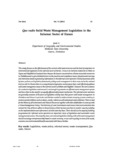Please use this identifier to cite or link to this item:
https://cris.library.msu.ac.zw//handle/11408/648| Title: | Quo vadis solid waste management legislation in the informal sector of Harare | Authors: | Jerie, Steven | Keywords: | Legislation, waste policy, informal sector, waste management, Quo vadis, Harare | Issue Date: | 2013 | Publisher: | Midlands State University | Series/Report no.: | The Dyke;Vol. 7, No. 1; p.32-48 | Abstract: | This study focuses on the effectiveness of the current solid waste practices and the level of compliance to environmental legislation in the informal sector of Harare. Focus is on the home industries in Mbare at Siyaso and Highfield at Gazaland since they are the largest concentrations of home industrial enterprises in Zimbabwe and to get a detailed picture on the practices and compliance issues. Questionnaire surveys and interviews aimed at generating information on the informal sector operators’ level of awareness of the by-laws, policies and legislative framework guiding waste management in their areas and at the national level as well. In Harare there is a comprehensive legislative environment that could effectively address solid waste management issues in the informal sectors of Mbare and Highfield. However, the mere existence of a conducive legislative environment is not enough to guarantee an efficient waste management system and hence there is also need for an equally efficient enforcement mechanism. The informal sector operators are generally unaware of the pieces of legislation and by-laws that govern solid waste management in Zimbabwe and Harare in particular and this has resulted in indiscriminate dumping of waste resulting in environmental problems such as odours, smoke, rodents as well as land and water pollution. There is need for the Ministry of Environment and Natural Resources together with other stakeholders to come up with a Waste Management Policy. The Ministry of Local Government could ensure that local authorities that include the City of Harare adhere to the provisions of their by-laws and there is need for capacity building on the implementation and enforcement of solid waste by-laws. There should also be capacity building programmes for informal sector operators on important pieces of legislation and sustainable waste management practices. Municipal by-laws and national legislation dealing with solid waste management should encourage entrepreneurship based on waste recovery, re-use and recycling in view of the social, economic and environmental benefits associated with these activities. | URI: | http://hdl.handle.net/11408/648 | ISSN: | 1815-9036 |
| Appears in Collections: | Research Papers |
Show full item record
Page view(s)
224
checked on Mar 4, 2026
Download(s)
146
checked on Mar 4, 2026
Google ScholarTM
Check
Items in MSUIR are protected by copyright, with all rights reserved, unless otherwise indicated.




